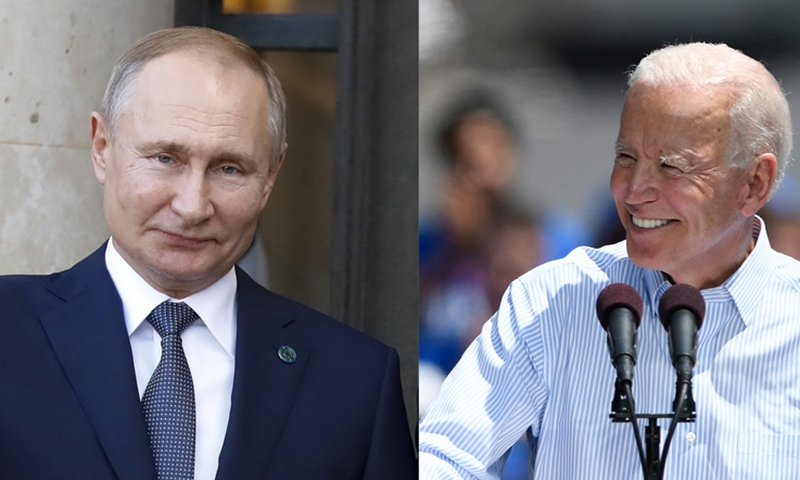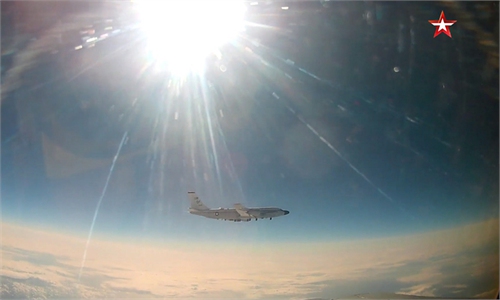
Xinhua file photos of Russian President Vladimir Putin (L) and U.S. President Joe Biden
Recently, the US and European countries have been intensifying their political crackdown and economic sanctions against Russia. As some Western countries and Russia continue to expel each other's diplomats under the provocation of Washington, it reminds many of the large-scale diplomats expulsions between the East and the West during the Cold War.
Judging from the practice of Washington's Russia policy under the Biden administration, the relations between Moscow and Washington today are inevitably deteriorating with stronger intensity.
The Biden administration's Russia policy shows that the US' posture is "anti-Russian hysteria." Russophobia has become the biggest political correctness of the US. The country even goes against Russia for the sake of being against Russia. It does so without paying any attention to the practical effects and the possible serious consequences.
Besides, Biden has a plan to lead the "free world" against rising authoritarian regimes, including Russia. This requires the leadership in Washington to maintain a strong coalition of democracies to fight its "ideological opponents" on a global scale. As for Europe: It is desperately trying to repair Europe-US relations in the post-Trump era. Strengthening Europe's anti-Russia stance is in line with Biden's wishes and becomes the way for the Europe to seek closer relations with the US.
As a result, anti-Russian sentiment has become the new norm of "political correctness" in both the US and Europe. In this light, it is not surprising that Washington's European allies have followed its lead to expel Russian diplomats on a large scale.
Yet Moscow has even prepared for a military conflict and to cut off contacts with the West.
The current radical US' policy toward Russia has presented the Ukrainian government a good opportunity. Kiev wants to get Washington's support in challenging Moscow to solve the problem of the two self-proclaimed states in eastern Ukraine or even to reclaim Crimea.
In fact, the Ukrainian government is exerting its military pressure in the two independent states in eastern Ukraine. It hopes to attract direct military involvement from the US and NATO. Moscow has prepared for a military race, or even direct military clashes, with the US and NATO over issues concerning the two states in eastern Ukraine and Crimea.
Russia's defense minister said on April 13 that "the [Russian] troops have shown their full readiness to fulfill tasks to ensure the country's security."
In its unprecedentedly tough retaliation against US' and Europe's political suppression and economic sanctions, Russia has named a list of eight incumbent and former US high-ranking officials who will be permanently banned from entering Russia, the Russian Foreign Ministry said in a statement published on April 16.
The ban on the director of the US intelligence service could mean that Russia no longer intends to engage in substantive intelligence cooperation with the US. Many signs are indicating that Moscow is ready to suspend diplomatic relations with the US and its radical European allies. After all, Russia has accumulated a lot of experience in diplomatic battles with US and the West.
On one hand, the US and European countries want to reduce the possibility of military conflict with Russia over the Ukraine issue. On the other, they have constantly intensified political conflicts with Russia.
All noticed that Biden initiated the phone call with Russian President Vladimir Putin on April 13. He also proposed a summit meeting in a third country "in the coming months" to discuss the full range of US-Russia issues, the White House said. Later, the US announced it cancelled a planned deployment of two warships to the Black Sea. Obviously, the US and its main European allies are not ready or able to mobilize their forces today to risk a confrontation with the Russian military — let alone open conflict.
This is why Biden initiated a phone call with Putin and proposed a "stable and predictable interaction" between Russia and the US. This format will enable the US to speak harshly against the Russia, impose economic sanctions and political repression to the limit, but avoid a military confrontation.
It will be very difficult for Washington and Moscow to make long-term, predictable strategic arrangements for their relationship under the current circumstances. Even if Russia and the US can hold a leaders' summit in the near future, the bilateral relations are still unpredictable in the short term. Like the blind feeling an elephant, every move will be an unpredictable course of events.
The author is the deputy dean of the Russian Institute of Tsinghua University. opinion@globaltimes.com.cn

